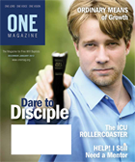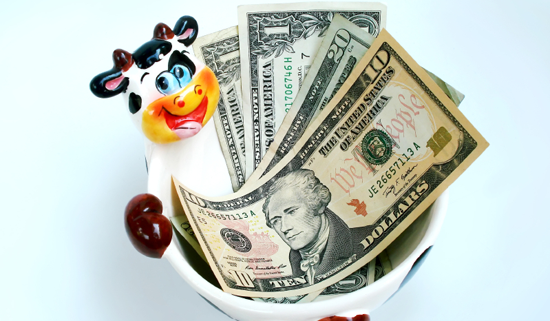
December-
January 2012
Dare to Disciple
----------------------
|

Money is a dangerous thing to trust.
Money: The Consolation Prize
by Brenda Evans
Arethusa’s Holsteins live high. There’s a sign on their barn that reads “Every cow in this barn is a lady; please treat her as such.” These ladies eat protein-enriched hay and lie on soft Canadian wood shavings in a flyless barn. Tails and hides are vacuumed daily then treated with hair care products like Pantene and Artec. And they have lovely names such as Veronica and Melanie.
In return, they give milk that brings $4.49 a half gallon, about twice the national retail average. Down the road, a rival dairy farmer scoffs. He calls his cows “working girls” and neither grooms nor names them. His Holsteins give good milk, he says, and customers pay just $2.79 a half gallon.
Arethusa’s owners are high-fashion shoemakers whose slingbacks cost $575 a pair. But recently, it’s been milk and not shoe leather that occupies their minds. Milk and exclusivity, that is. Classy cows produce classy milk, you know. And in case you’re wondering, Arethusa’s milk is non-organic because, along with hair products and fly spray, they use antibiotics.
As amusing and ridiculous as the concept of classy milk is, it’s an interesting measure of what we think money buys these days. I’ve talked about possessing and using money in previous months, and I’m riding the money horse again this month.
Let me briefly recap those past two articles.
For Christians, possessing wealth is good. It gives us, God’s redeemed people, the responsibility under him and his power to own, direct, and use wealth for just, righteous, and true purposes. That means we must be disciplined and generous in our use of money—both lavish and frugal. Motivated by love yet restrained by wisdom.
But that’s about possessing and using wealth. What about trusting wealth? Can we possess and use money yet not trust it? I think we can. I’ll make a few points about that.
Money messes with our minds. Think about the connection between elitism, entitlement, exploitation, and money. And what about our dependence on it and its tyranny over us? If we have a lot, we think we’re self-sufficient. If we have little, we fall into self-pity.
I’m convinced we can possess money, lots of money, yet not be possessed by it. But it’s not easy. Jesus, Paul, James, and a lot of others have all made strong cases on that point.
The thing is, money is our security. One night several years ago, my husband Bill and I met death in a dark alley. We bolted forward, trying to outrun him. And eventually we did, by the Lord’s grace. But a year later we came out of that alley shaken. In addition to running for our lives, we had made new money goals, revamped our savings and retirement plans, started putting away every copper we could find in preparation for the future.
And that’s another problem with money. Enough of it makes us feel safe, certain about the future, a future that we cannot possibly know. “I’ve got it covered. I’m in control,” we say. But we’re wrong. James nails us for that. It’s arrogance, boasting, presumption, he says (4:13-16). We don’t even know about the end of today, much less the time yet to come, next year, next decade.
Then how much is enough? Money magazine recently asked, “How much money would you need to feel secure?” Twelve percent said $500,000; 38% said more than $2 million. Others were somewhere between. My experience is that the amount I think is enough keeps moving—and always higher.
So I aim at saving everything I possibly can. Though retired, Bill and I still save money every month. Another goal is to live frugally yet freely, wisely yet generously under the Lord’s guidance. The other thing we’re working on, and this is the hardest, trust the Lord—not money—to take care of us until death.
Author Kathleen Norris lives on a treeless plain in the western Dakotas. She knows what is dear. On this bare plain you visit a tree as if it were a person. “Scarcity makes things more precious,” she says. “What is enough? The more I can distinguish between my true needs and my wants, the more I am shocked to realize how little is enough.” I need discernment and faith to attend only to my true needs and to godly wants.
Then of course, we live as if money means everything. As if dollars buy all we want. We lean on money, trust it as if it keeps all our options open. My father used to call some things “no account.” He might have been a tool, a mule, or even a man. Whatever it was, I knew that thing was worthless in his eyes. When will we admit that money is no account for those things that bring us deepest satisfaction and hope? Can we really buy everything we want at Macy’s, Wal-mart, Juicy Couture, E-Bay, or a high-end car dealership?
John MacArthur shocked me recently when he called me, and people like me, practical atheists. People who live life, make plans, buy and sell as if God does not exist. As if money makes us secure, gives us status, makes us happy, and that’s all we need and want. He and James and, of course, Jesus are hard on people like us. People whose needs and wants are only material, physical.
James terrifies me with his description of these self-indulgent practical atheists. Their silver and gold testify against them. They are wailing, exploitive materialists, hoarders fattening themselves for slaughter. They are like my father’s corn-fed steers who didn’t know the knife was coming. Yet the Lord Almighty hears them. He knows what they are (5:1-6). I want to distance myself from them. Then I remember that James wrote this letter to his brothers (and sisters) in Christ (1:1-2), people like me. So I am warned against trusting and leaning upon money for my needs and wants.
Have you ever gotten a consolation prize? You know, it is always astep below the real prize, the winning prize. I don’t want to walk on heretical ground here, but I think Jesus does a little tongue-in-cheek thing in Luke 6 about consolation prizes.
He pronounces both blessings and woes to a mixed group of saints, seekers, and sinners (Luke 6:17-26). In his woe to the rich, he says they have already received their consolation (or comfort as some translators say). Either way, Jesus seems to mean, “You’ve already gotten your prize, second best and earthly, but your prize, nonetheless.”
Wealth is a prize all right, a good gift, but not the big one, not the best one. Not the eternal, forever, heavenly one. It’s a consolation prize, and I’ll not settle for it. I want the real thing.
Money is a dangerous thing to trust. It messes with my mind. It gives me false security. It doesn’t mean everything, although I sometimes act like it does. It doesn’t give me what I really want and need. It’s the consolation prize, not the real thing.
About the Writer: Brenda Evans, a retired English teacher, lives in Cattletsburg, KY, with her husband Bill, former director of the Free Will Baptist Foundation. Learn more about life and money at www.fwbgifts.org.
|
|

